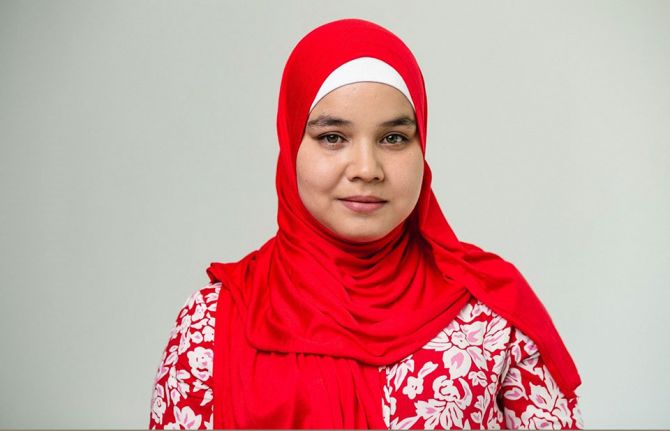

Feature Story
Meet Azima: Frontline hero of the HIV response in Uzbekistan
27 May 2024
27 May 2024 27 May 2024Azima has lived with HIV since childhood; she was abandoned by her parents and raised by her grandmother.
Today she is recognized as an inspirational community leader in the HIV response, including for the vital role she has played in tackling stigma as the first young woman in Uzbekistan to disclose her HIV-positive status.
"I am strong. I have a bright future ahead. And I will achieve my goals,” says Azima.
She has faced both positive and negative reactions since her disclosure. Throughout, Azima has remained a committed activist. She is especially thankful to her community of peer support, a group of children and young people living with HIV supported by UNICEF.
“In the end, the energy of the people who supported me was so strong that it helped me rise above other people's criticism,” she said.
As a peer educator, Azima works tirelessly to raise awareness about HIV.
Today, Azima is studying psychology at Fergana State University. This choice of future career was encouraged by her grandmother and inspired by a psychologist who worked in her support group.
Because of her HIV treatment, Azima cannot transmit HIV to her husband. Several months ago, she gave birth to an HIV-free baby girl.
She is thankful for her family. “My husband has always supported me,” says Azima.
Azima’s story exemplifies the progress made in Uzbekistan’s HIV response. Antiretroviral therapy is provided free of charge to all in need in Uzbekistan. The country is also making efforts to ensure all women living with HIV receive timely treatment, so that all babies will be born HIV-free. Coverage of pregnant women who receive antiretroviral treatment to prevent vertical transmission of HIV has been around 98% since 2016, according to the Uzbekistan Republican Center to fight AIDS.
“The rate of vertical HIV transmission in 2023 was 0.2%. We aim to reduce this figure to 0%. The Republic of Uzbekistan is on the verge of receiving an international certificate for the elimination of mother-to-child HIV transmission,” said Bahrom Igamberdiyev, Director of the Republican AIDS Center in Uzbekistan.
The country has approved a "Roadmap for Implementing Measures to Achieve the Validation of the Elimination of Mother-to-Child Transmission of HIV for 2024-2026". This roadmap will be implemented with the participation of all partners, allowing Uzbekistan to reach its goal and obtain validation for the elimination of vertical transmission of HIV. An effective HIV response is a priority for both the government and civil society in Uzbekistan.
However, some critical challenges in the HIV response in Uzbekistan, particularly concerning HIV prevention, which are deeply rooted in societal norms and systemic inequalities.
These, according to the recently released Gender Assessment Report for Uzbekistan, include limits on women's decision-making power, leaving many women dependent on male relatives for important life choices, including healthcare decisions.
Despite the Government’s commitment and legislative efforts to address gender-based violence, underreporting remains a significant issue. The prevalence of early and arranged marriages also contributes to the limited autonomy of women, depriving many of them of educational and economic opportunities and impeding access to comprehensive sexual education. Cultural norms limit open discussions on reproductive health and prevention in many social contexts including family and educational settings.
As a result, the latest survey found that only 14% of women between 15 and 49 years old have comprehensive knowledge about HIV. This reduces to 10% for young women between 15 and 25 years old. “Addressing these systemic issues requires comprehensive efforts to promote gender equality, ensure access to sexual and reproductive health and rights, and empower women economically. UNAIDS is working with partners to improve access to education and create an enabling environment for women to realize their full potential,” said Eamonn Murphy, UNAIDS Regional Director for Asia-Pacific and Eastern Europe and Central Asia.
Azima is stepping up her advocacy role, pointing out that openness and education are crucial in fighting stigma and advancing access to prevention, testing and treatment. She advises young women to disclose their HIV status to partners early in relationships and emphasizes the importance of adherence to treatment and of mutual support within families.
Azima will continue breaking stereotypes, promoting awareness, and embracing her journey with courage and determination. Azima exemplifies the learning that HIV responses succeed when we let communities lead.


